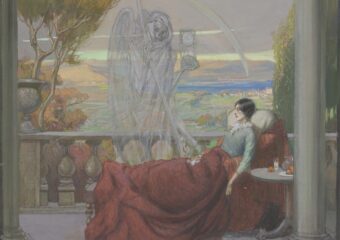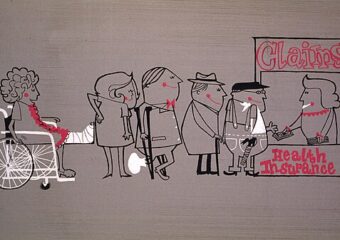People with dementia experience a deterioration in their mental and physical functions over time. The particular functions affected can vary as can the rate of deterioration. Biomedical texts typically characterize these changes in neuropsychiatric terms based on behavioral observations and clinical findings. At a certain stage of dementia, and not an advanced stage, the people with dementia cannot describe their experience in much detail if at all. Authors of literary fiction and nonfiction who bring characters and subjects with dementia into their stories have had to imagine what the experience must be like. These literary renderings can elaborate on the clinical descriptions such that they relate more to what people actually experience in their lives.
Here a classic biomedical description of dementia is compared to descriptions taken from a literary novel.
The Biomedical
From Harrison’s Principles of Internal Medicine, 21st edition, McGraw-Hill, 2022
In the middle stages of AD, the patient is unable to work, is easily lost and confused, and requires daily supervision. Language becomes impaired—first naming, then comprehension, and finally fluency. Word-finding difficulties and circumlocution can be evident in the early stages, even when formal testing demonstrates intact naming and fluency. Apraxia emerges, manifesting as trouble performing learned sequential motor tasks such as using utensils or appliances. Visuospatial deficits begin to interfere with dressing, eating, or even walking, and patients fail to solve simple puzzles or copy geometric figures. Simple calculations and clock reading become difficult in parallel.
Rabinovici GD, Seeley WW, Miller BL. Alzheimer’s Disease. In: Loscalzo J, Fauci A, Kasper D, Hauser S, Longo D, Jameson J. eds. Harrison’s Principles of Internal Medicine, 21e. McGraw Hill; 2022. Accessed October 12, 2023. https://accesspharmacy.mhmedical.com/content.aspx?bookid=3095§ionid=262997915
The Literary
From The Wilderness by Samantha Harvey, Anchor Books, New York, 2009
The novel focuses on a man probably in his sixties and the four years he progresses from early signs of dementia through the time he becomes oblivious. At various points in the novel, his dementia experience is described. Excerpts of these descriptions follow. A review of the novel is posted here.
In amongst a sea of events and names that have been forgotten, there are a number of episodes that float with striking buoyancy to the surface. There is no sensible order to them nor connection between them.
p. 1
Confusion passes across him, across his skin. He can feel it these days as a bodily sensation not unlike a rash. He wants to itch at it.
p. 40
I feel like all my wires are being unplugged one by one. No, not even in an order, just unplucked.
p. 189
He looks at his watch and studies the hands but cannot fathom how a hand here and a hand there—and another edging continually behind them—is supposed to reveal the time of day.
p. 181
…he doesn’t know now, reaching back into the memory is like putting his hand into a box blindfolded, knowing there are objects but not knowing quite what they are.
p. 342
For a moment he forgets everything he had ever known, not just facts but the art of how to get facts. The utter blankness amounted to one solitary, stammering thought: What is it I’m supposed to do now?
p. 46
What frightens him is this—the way objects rush and trip over themselves to support his confusion. He looks around his car and tries to remember what make it is; he cannot. He opens the window to feel what month it is. It isn’t a month. There aren’t months. There are just happenings, a lack of signposts.
p.29
Her letter is long. It has a plot, something about a trip to Phoenix and the lack of grass there, and the question she poses: How can people live without grass? He doesn’t know the answer. Maybe he doesn’t know about people anymore. But he could live without anything if he could have his thoughts back.
p. 207
Note: This novel is featured in an episode of the affiliated podcast, The Clinic & The Person: He Wants to Itch at It: A Novel, A Play, and a Movie Imagining Dementia.



